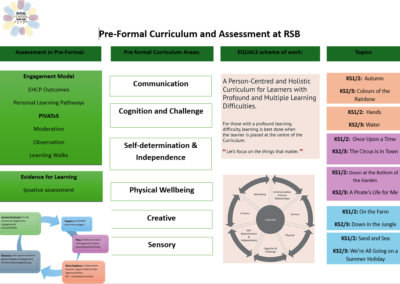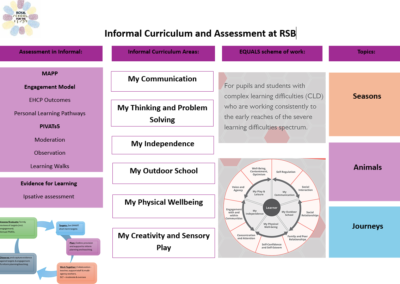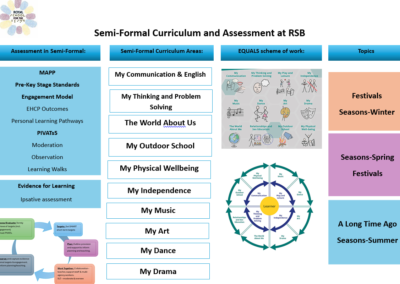Curriculum
Our Curriculum
Curriculum Intent
Please click here for our whole school Curriculum Overview
At the Royal School for the Blind, we want our students to be happy, to feel safe, to achieve their potential and to feel valued as a member of the community.
We know that some pupils benefit from a curriculum which places greater emphasis on functional learning and developing independence.
In response to the New Ofsted Inspection Framework (2019) and the Rochford Review (2016) we have developed a curriculum which has moved away from a traditional subject specific model to a curriculum that focuses on enjoyment and engagement in learning and has a clear purpose on ‘getting it right for everyone.’
To enable our pupils to meet their full potential, we have incorporated the Equals curriculum and adapted it into our provision in both the primary and secondary phases (Key Stage 1-3). Equals is a National pathway which combines classroom-based learning with functional community access focused on daily living activities.
It has been developed across three Key Stages (K1-K3) and is separated into three pathways to ensure appropriate provision for all pupils.
The three pathways are:
- Pre-Formal • Informal • Semi-Formal
Pre-Formal Curriculum
- The pre-formal curriculum is designed for those pre-symbolic to early symbolic learners who are at very early levels of development and access a curriculum that enables them to develop a sense of security in the school environment, which is comprehensible and meaningful to them.
- It is a personalised holistic curriculum that focusses on the early communication, social and emotional and cognitive skills that are the foundation of learning.
- The focus is upon enabling learners to establish positive interactive relationships with others, to proactively explore the world around them, gaining environmental control skills. All pupils will also be given maximum opportunities to achieve the highest level of personal mobility and independence.
- This curriculum recognises the importance of play in a pupil’s development and the need for sensory and multi-approaches matched to the pupil’s personal learning goals arising from their EHCP.
Please click here for Pre-Formal long term plan
Informal Curriculum
The informal curriculum is designed to support our pupils with emerging intentional communication, emerging contextual awareness and who have emerging social awareness. This curriculum is designed to support individual Pupil Learning Pathways.
It is important to recognise that there are many differences in individual profiles of this group of learners, and these may well be spikey learning profiles.
At RSB, our focus is to provide familiar routines and to scaffold the learning environment to help support early problem-solving skills.
This curriculum also recognises the importance of play in a pupil’s development and the need for a variety of teaching styles matched to the pupil’s personal learning goals arising from their EHCP. Movement is key within our informal curriculum and we support this through sensory circuits, sensory diets, regulation and physical activities throughout the school day.
Please click here for Informal long term plan
Semi-formal Curriculum
The semi-formal curriculum recognises that many of our young people learn differently and is a personalised learning approach based on becoming literate communicators and early readers, becoming mathematical and scientific thinkers; the acquisition of early learning skills; and personal emotional and social development and mental well-being which encompasses the development of thinking skills, play (emotional, cognition and social dimensions), creative learning and movement. Pupils following our semi-formal curriculum, learn best when learning is related to their own experience and they are given opportunities to explore their own interests.
Some may learn through play; others will learn more effectively through functional activities, and yet others will respond well to a theme-based approach. The curriculum content extends engagement for learning. Personalised learning includes targets from EHCP
Please click here for Semi-formal long term plan
Post 16 Curriculum
The Post 16 curriculum supports a wide range of learners typically working from P3 upwards with reaches to the NC for SLD and MLD. Some of our learners may have considerable sensory sensitivities and/or face other barriers to learning such as physical difficulties, medical conditions, social and emotional needs, sensory processing, visual or hearing impairments, communication difficulties.
The Post 16 curriculum is a personalised curriculum that:
Incorporates the ASDAN Life skills Challenges and has a strong focus on developing independence and vocational skills.
Develops communication skills, social skills, vocational skills and independence by providing explicit instructions and sufficient time for learners to repeat, practise, maintain and consolidate skills to prepare them for adulthood.
Provides meaningful contexts for learning that use real-life materials and experiences, concrete resources and practical everyday activities so that learners link experiences and make connections.
Provides opportunities for generalising and applying skills and knowledge across curriculum areas.
Acknowledges that the physical wellbeing and development of our SLD learners is important.
Please click here for the Post 16 Long term plan
EYFS Themes
Please click below for the Curriculum Long Term Plan
| Cycle 1 | Cycle 2 | |||||
| Autumn | ||||||
| All about me / People who help us | Woodland and Forest / Christmas | All about me / Weather and Seasons | Transport and Travel / Christmas | |||
| Spring | ||||||
| Zoo | Gardens and Minibeasts | Food | Under The Sea | |||
| Summer | ||||||
| All around the World | Seaside | On the Farm | The Jungle | |||
These topics and activities will be differentiated accordingly to support the individual needs and abilities of the children.



